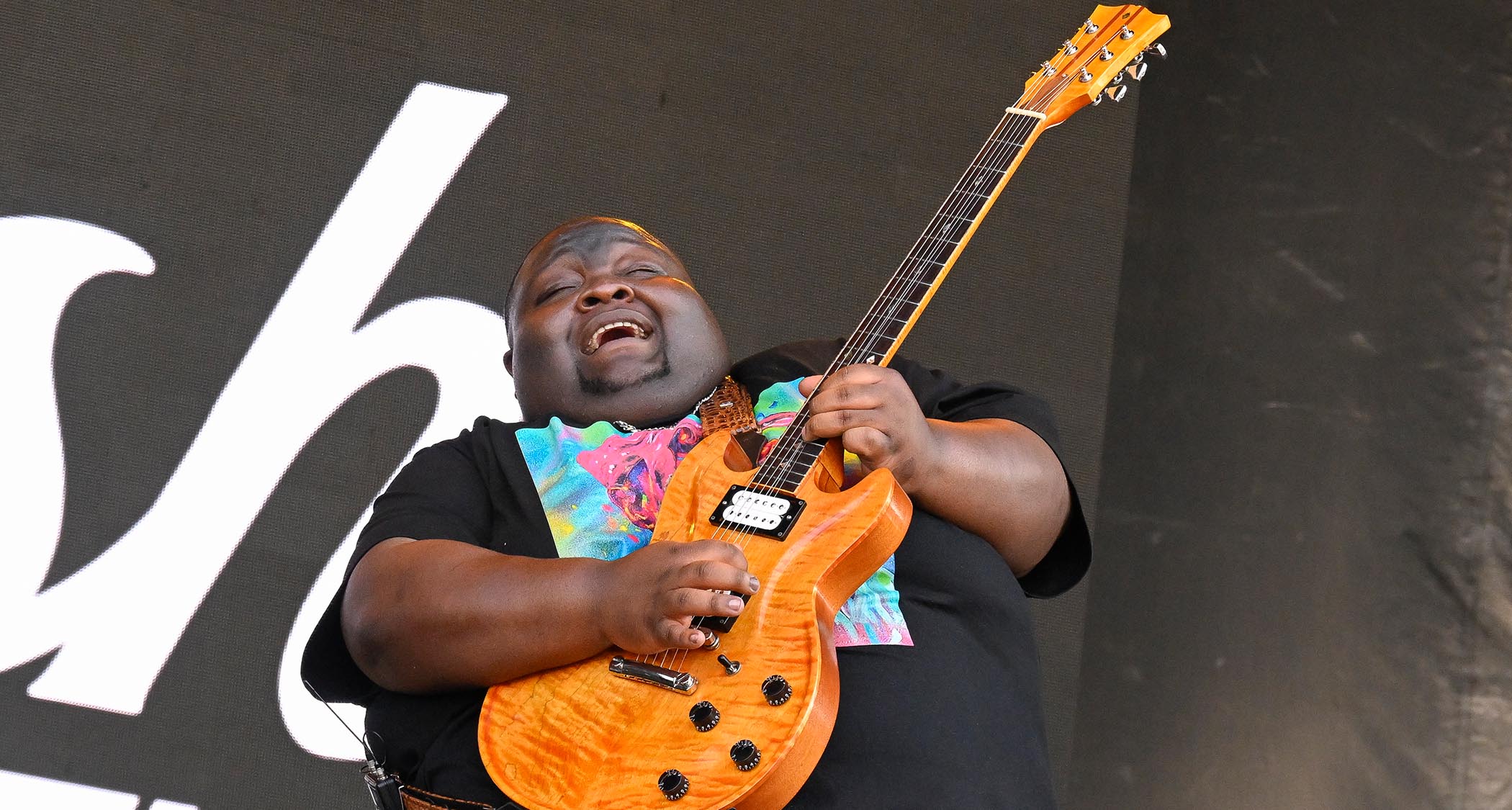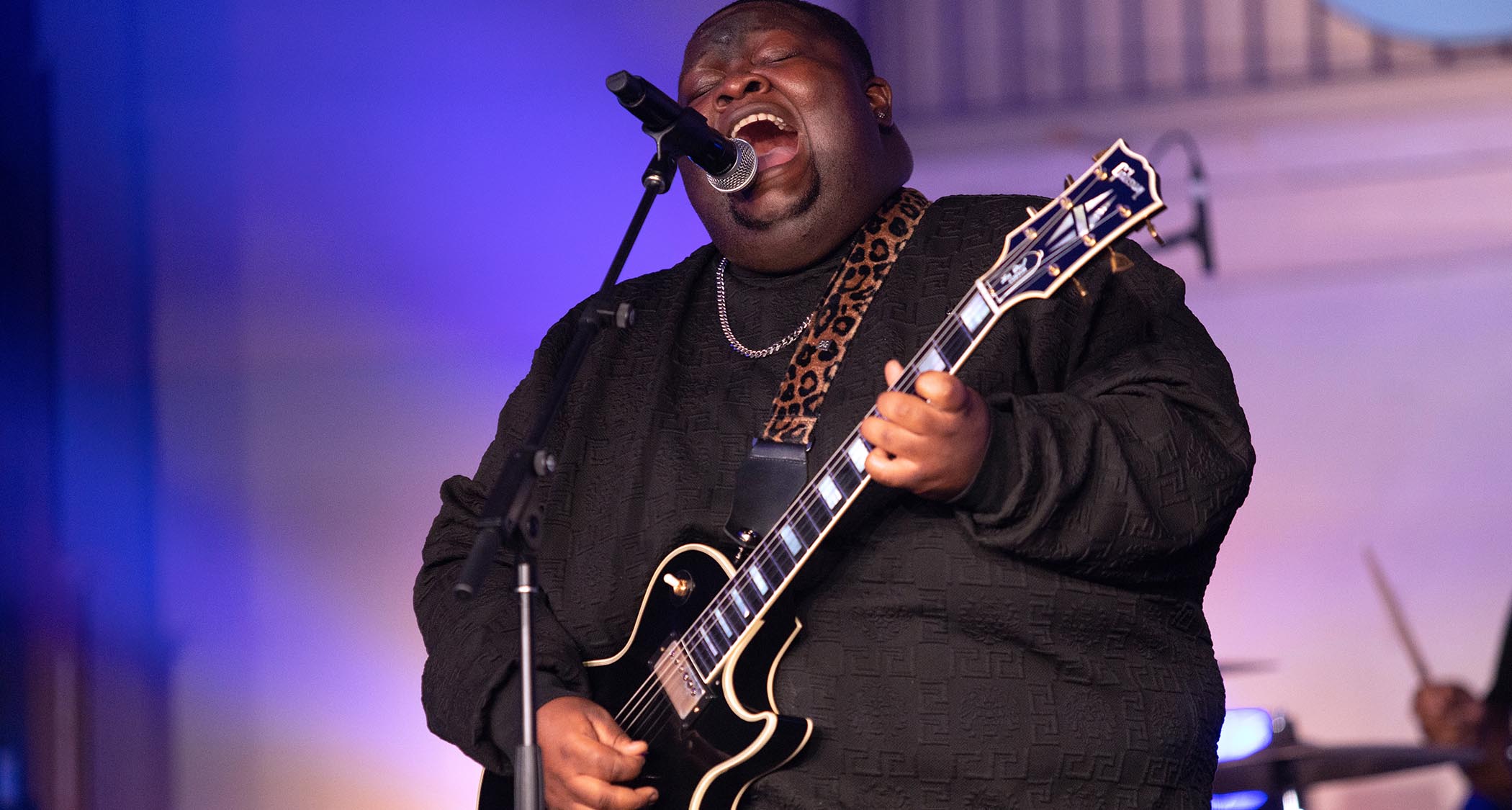“Slash has jammed with B.B. King – not many rockers could hang with the blues OGs like that”: Christone ‘Kingfish’ Ingram first heard Slash on Guitar Hero – now he’s hitting the road in the GN'R man’s traveling blues show
Kingfish is leading the charge for a new generation of blues heroes. Here he checks in to talk soloing styles, the message behind the blues and Slash's upcoming S.E.R.P.E.N.T. Festival

All the latest guitar news, interviews, lessons, reviews, deals and more, direct to your inbox!
You are now subscribed
Your newsletter sign-up was successful
Any conversations concerning the future of blues will usually include a mention of 25-year-old Mississippi sensation Christone ‘Kingfish’ Ingram. So it should come as little surprise that he’s met and jammed with nearly all of the acts appearing on Slash’s S.E.R.P.E.N.T. festival, including his hero, Eric Gales…
What will the audience get from your set at S.E.R.P.E.N.T.?
“In recent years, I’ve been adding a lot of funk and R ’n’ B grooves into my show. So the crowd will get a mixture of things – it won’t just be blues or hard rock. As well as songs I haven’t played much before, there are at least two new songs from my upcoming record that we’ll be performing. I also have some new guitars that I’m bringing out…”
That’s interesting. Tell us more!
“I can’t go too deep because I don’t want to upset my family at Fender. But there’s a custom ES-339-style guitar that I’ve started using and another Les Paul-style guitar that I’ve added to the arsenal, both made by another brand. I’ll be using those along with my Fender signatures.”
Is there anything else you’re looking at changing, rig-wise?
“Well, since we last spoke, I ended up going back to the Marshall Shred Master. That one’s back on the ’board. I want to do something different in terms of amps. The plan is to run two Fender DeVilles through with my pedalboard. I’m hoping I’ll have that as my main rig by the time we hit the road for this tour.”
All the latest guitar news, interviews, lessons, reviews, deals and more, direct to your inbox!
What kind of message do you think this festival sends in terms of culture?
“There are people out there who say the guitar is dead and guitar solos no longer exist. And I know for a fact there will be a lot of great guitar playing at these shows. Our job is to prove that it’s still a thing and that the blues can be directed to a younger crowd, too. There are many forms of contemporary blues and mine is just one of them.”
The festival name itself is an acronym for Solidarity, Engagement, Restore, Peace, Equality N’ Tolerance. Many would say these are all things the world needs more of right now… We need to stick up for each other!
“Definitely! The world is in a bit of a tangle at the moment. All it takes is music to give us the hope to heal. It’s this magical thing we can all connect to. You can break boundaries through sound. I love what this festival represents and stands for.”
Eric Gales is on the bill. Given what you’ve said about him in the past, we’re guessing that’s one set you’ll be watching every night…
“Oh yeah! I think I’ve seen him a lot of times by now, and every time I’ve learned something new. I will have my eyes glued, for sure! I actually know a lot of the artists on this line-up.
“I’ve jammed with Eric, Larkin Poe, Robert Randolph and Samantha Fish in the past. Jackie Venson is a great guitar player as well, and I’ve jammed with her, too. I met Warren Haynes one time and it was a great interaction. There are a lot of killers on this tour… It’s a star-studded line-up, for sure!”
Music can help you forget about all the bad things and ugliness in the world. It’s all about beauty and positivity, even if it originates from people struggling
On Eric’s last album there was a song called The Storm where he asks ‘How can you love what I do, but hate who I am?’ That’s very poignant, given the message behind this festival.
“Yeah! Stuff like that ties into what the blues is and where it came from. It was originally a form of protest music. It was used to tell people to resist and talk about the tough situations they were being put through. That said, music can help you forget about all the bad things and ugliness in the world. It’s all about beauty and positivity, even if it originates from people struggling.”
Is it safe to assume you’re a fan of Slash? What are your favourite things about his playing?
“I think everyone knows about Slash and the band Guns N’ Roses. How could you not? My introduction to him was actually through the video game Guitar Hero! He did that live show a long time ago called Slash’s Blues Ball, which there are recordings of. I’ve always loved the version of The Thrill Is Gone on that album. I’ve been a big fan of his guitar playing, especially the bluesy side of it, for a long time.”
Why do you think he ended up becoming one of the most iconic guitar players of all-time?
“People have always been drawn to Slash because he’s technical but also has a lot of feel. He’s definitely not just an average pentatonic player, he has a lot of swagger in how he plays. If you listen to Sweet Child O’ Mine, there are so many different elements – from pentatonic bends to harmonic minor ideas. He’s got a whole lot of range.
The general public aren’t as interested in your guitar solo as other guitar players. It’s more about the hooks and the catchiness of it all
“On tracks like November Rain, he could slow down and play from the heart. I learned that myself from an early age. The general public aren’t as interested in your guitar solo as other guitar players. It’s more about the hooks and the catchiness of it all. You can say more with three notes than three thousand.
“Now, let me just say, it’s fun to play three thousand notes! I’ve been there, and I still do it too sometimes. But if you want the audience to feel something powerful, you should simplify your ideas. Slow and steady wins the race, as they say, and someone like Slash always takes you on a journey. He’s a global icon who represents what rock ’n’ roll is, and definitely helped sell a lot of Les Pauls and Marshall heads!”

Have you met him yet?
“I haven’t met or jammed with him ever. We’ve spoken on Instagram a couple of times. I found out from a couple of friends that he was a fan of mine. We talked very briefly online, and then again when he was putting this festival together and wanted to give me the opportunity to play. Hopefully I’ll get a chance to meet him and talk to him properly, just so I can say how much I appreciate him and thank him for inviting me!
“I was digging the Killing Floor cover he did with Brian Johnson from the new album. It was very hard rock, but it also had a funky vibe, too. He’s jammed with B.B. King – not many rockers out there could hang with the blues OGs like that.
“It’s obvious he had a lot of respect for B.B. and it’s clear the respect was mutual. Everyone can hear the blues root in Slash’s music. There can be no doubt he’s a blues player at heart. He almost makes love to the guitar!”
- Live in London is out now via Alligator.
- See S.E.R.P.E.N.T. Festival for more on Slash's all-star blues fest.
Amit has been writing for titles like Total Guitar, MusicRadar and Guitar World for over a decade and counts Richie Kotzen, Guthrie Govan and Jeff Beck among his primary influences as a guitar player. He's worked for magazines like Kerrang!, Metal Hammer, Classic Rock, Prog, Record Collector, Planet Rock, Rhythm and Bass Player, as well as newspapers like Metro and The Independent, interviewing everyone from Ozzy Osbourne and Lemmy to Slash and Jimmy Page, and once even traded solos with a member of Slayer on a track released internationally. As a session guitarist, he's played alongside members of Judas Priest and Uriah Heep in London ensemble Metalworks, as well as handled lead guitars for legends like Glen Matlock (Sex Pistols, The Faces) and Stu Hamm (Steve Vai, Joe Satriani, G3).




